
Submitted by Alicia Bennett, Public Affairs Officer, U. S. Forest Service Job Corps
It is not uncommon for Job Corps Civilian Conservation Center (CCC) students to radically transform their lives upon entering the program. Unsurprisingly the experience remains with them. That was the case for Fort Simcoe Job Corps Civilian Conservation Center Assistant Fire Management Officer (AFMO) Matthew Ball. He enrolled at Fort Simcoe Job Corps CCC in 2002. His first trade choice was Heavy Equipment Operations Mechanics but it was full. So, he enrolled in Culinary Arts waiting for a slot to open. Job Corps was better than his life before–doing drugs and going nowhere in life. “From the age 15 to 22, my life was a blur of doing drugs and running crazy which left me homeless. I’d hit rock bottom and I had nowhere else to go,” states Ball. “I needed a bed to sleep in. It was a pillow. It was some food.” Ball decided that hanging out at Fort Simcoe Job Corps for a couple of years was a pretty sweet deal.
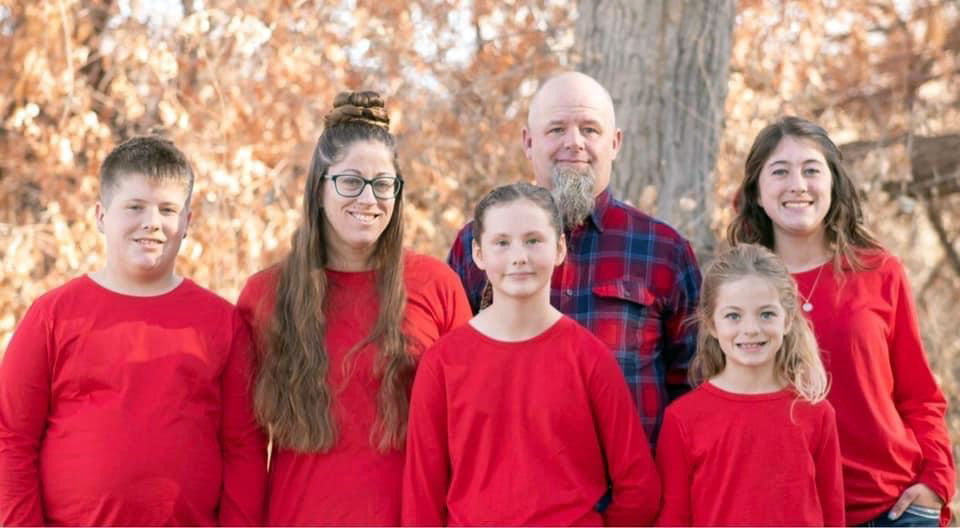
The Matthew Ball Family: (l-r) Samuel, Toni, Lillie may, Matthew, Akemi, and Brianna Ball. Photo courtesy of Matthew Ball.
Established on April 15, 1966, Fort Simcoe was then operated by the Bureau of Reclamation prior to its transfer to Forest Service operations on January 17, 2010. During his enrollment, Fort Simcoe students could work as contract wildland firefighters with the Bureau of Indian Affairs (BIA). After getting a taste of fire, Ball was hooked and requested a transfer to Wolf Creek Job Corps so he could join its Hotshot Crew. There were some twists and turns, but Ball ultimately got a job as a seasonal, graduated from Wolf Creek in 2004 and was accepted an apprenticeship in Region 5. “Sixteen years later, I have a wife, three kids, and I own my own home and yes, I owe it all to Job Corps,” states Ball
Ball sought to promote the interests of the Job Corps students throughout his career. When a position opened up, as a Sequoia National Forest Assistant Captain, he would search for a Job Corps student or graduate to fill it—which often required out-of-the box thinking. “There were issues on the Sequoia with Job Corps students in the past but to me they were minor—the towel shouldn’t have been thrown in. Never give up on anyone trying to be successful,” he shared. “I was never in the position to really sell Job Corps. I am coming to the point in my career where I do want to complete the circle and give back to what has given me life and that is Job Corps.”
Job Corps fire management set out to recruit Ball, giving him a choice off CCCs. Ball did not hesitate in selecting Fort Simcoe despite the sacrifices required of him and his family. It required pulling his 16-year-old daughter and sons, 15 and ten—from everything they’ve known. Ball’s wife was suddenly unemployed with uncertain job prospects. Affordable housing within driving distance of Fort Simcoe suitable for a family was non-existent. For two months, the family lived out of a Fifth Wheel before snagging literally the one house within reach at a price of $320,000—a stretch when you only clear $4,200 a month in salary. “All the kids hobbies were put on hold because I took a pay cut,” shared Ball.
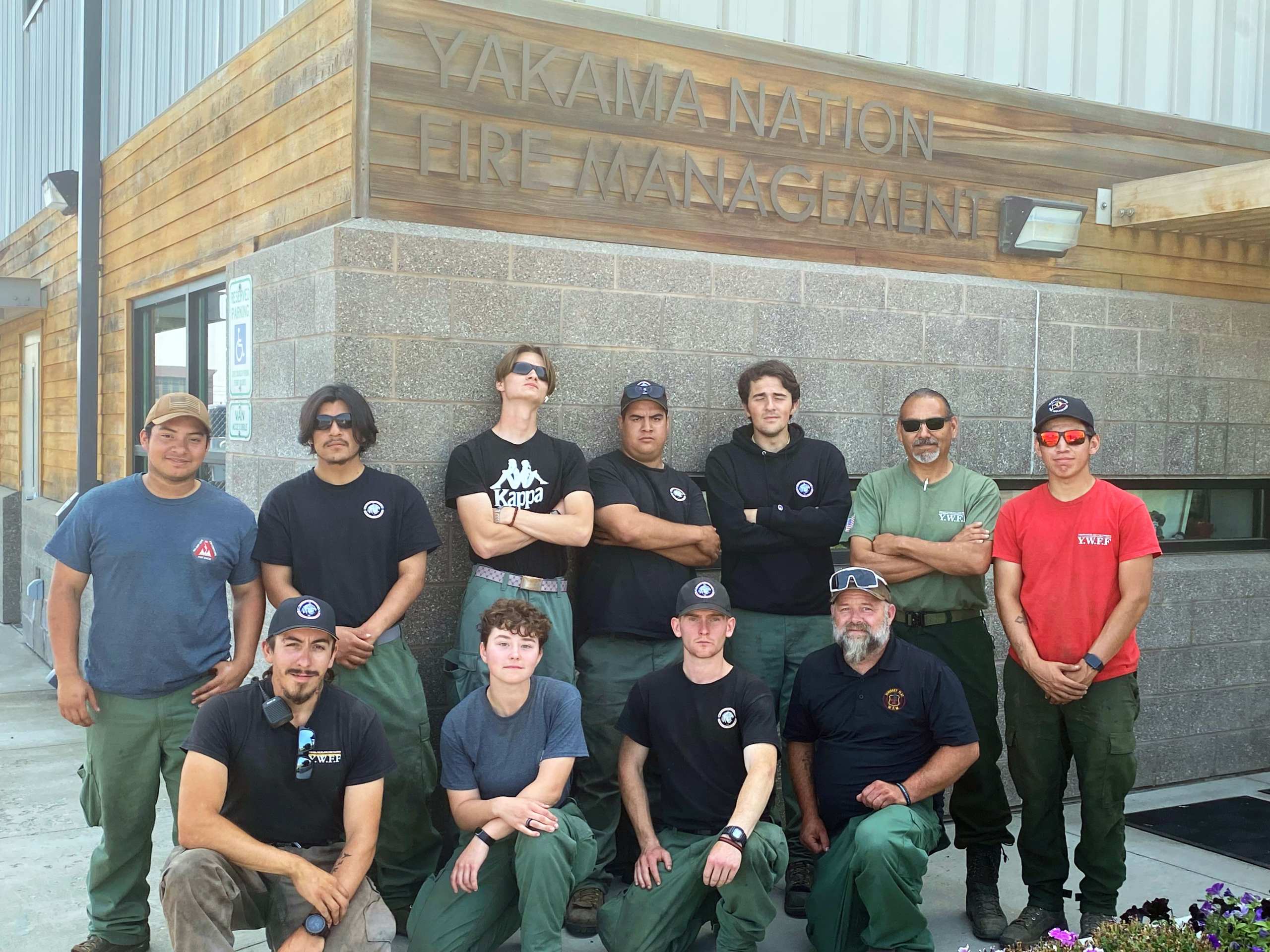
Fort Simcoe and Yakama Nation wildland firefighters stop for a photo in front of the Yakama Nation’s Fire Management Office before heading out to patrol Yakama Nation tribal lands on the Treaty Days holiday weekend in June 2023. Along with patrolling, the firefighters removed brush on a roadway for a thinning project. USDA Forest Service photo by Matthew Ball.
Presently, Fort Simcoe is past its glory days. Ball wants to be part of the change that brings those days back. Key center leadership departed and the center’s relationship with the Yakama Nation died after Fort Simcoe was transferred to the Forest Service. During Ball’s enrollment, nearly half of Fort Simcoe’s students were tribal members and a large percentage of the staff were also members. The Nation sponsored the fire crew and wildland firefighter shirts said BIA. Ball had never lost contact with either Fort Simcoe or the Nation. “When I heard about this job, I called everyone and said, “I’m coming back,” Ball stated. “I want to bring back that partnership where I can get help from them and in return we can help them as well. I want that relationship back with them. The Nation is right here and it is our closes ally.”
Even before the recently announced “Equity Action Plan meant to strengthen Tribal consultations and Nation-to-Nation relationships, Ball’s first priority was re-establishing the center’s partnership with the Yakama Nation.
“Rebuilding our relationship with Job Corps has been beneficial to our fire program,” stated Yakama Nation AFMO Don Jones. “It’s nice to have fire support right out our back door. The Fort Simcoe center director and fire staff have been key to setting this solid foundation.” Partnership opportunities include cross-training, student and overhead assignments on the Nation’s wildland type 6 engine, and Fort Simcoe’s heavy construction equipment operations trade students supporting infrastructure work on Tribal lands.
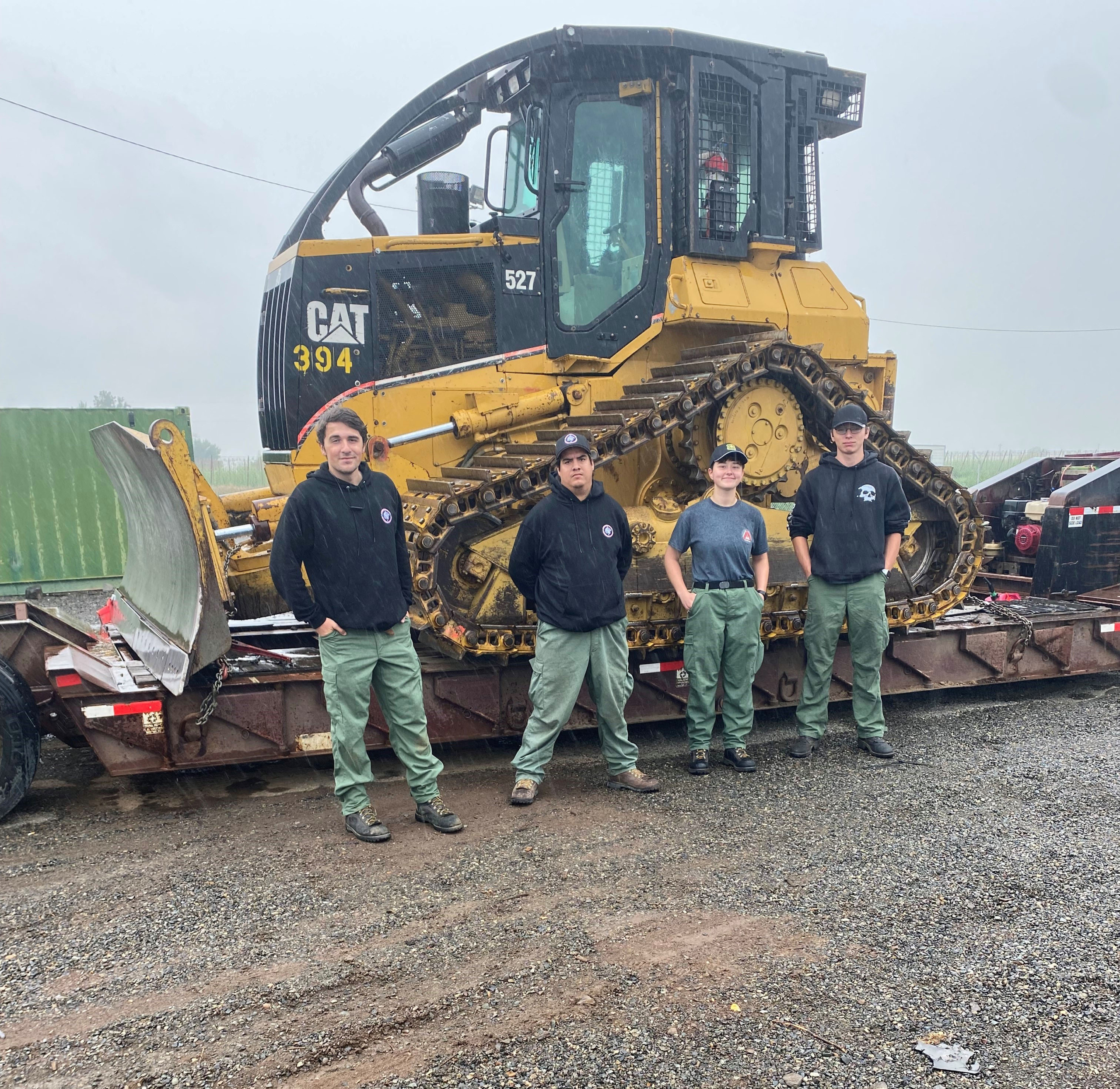
(l-r) Fort Simcoe Job Corps students Nathen Jenson and Thomas Proctor and Columbia Basin Job Corps students Navaeah Gross and Jayson Robbins were part of a five-person module that helped patrol Yakama Nation tribal lands on the Treaty Days holiday weekend in June 2023. Along with patrolling, the Fort Simcoe module worked in close conjunction with the Nation’s fire management resources to remove brush on a roadway for a thinning project. USDA Forest Service photo by Matthew Ball.
Now facing the reality of the challenges Fort Simcoe’s facing, Ball is occasionally nervous. “Will I be successful? With the people who have been here before me I have some big shoes to fill,” he mused. My heart is with Fort Simcoe but I have a lot to lose. But, if I can walk away with a fully functional fire program I will be happy.”
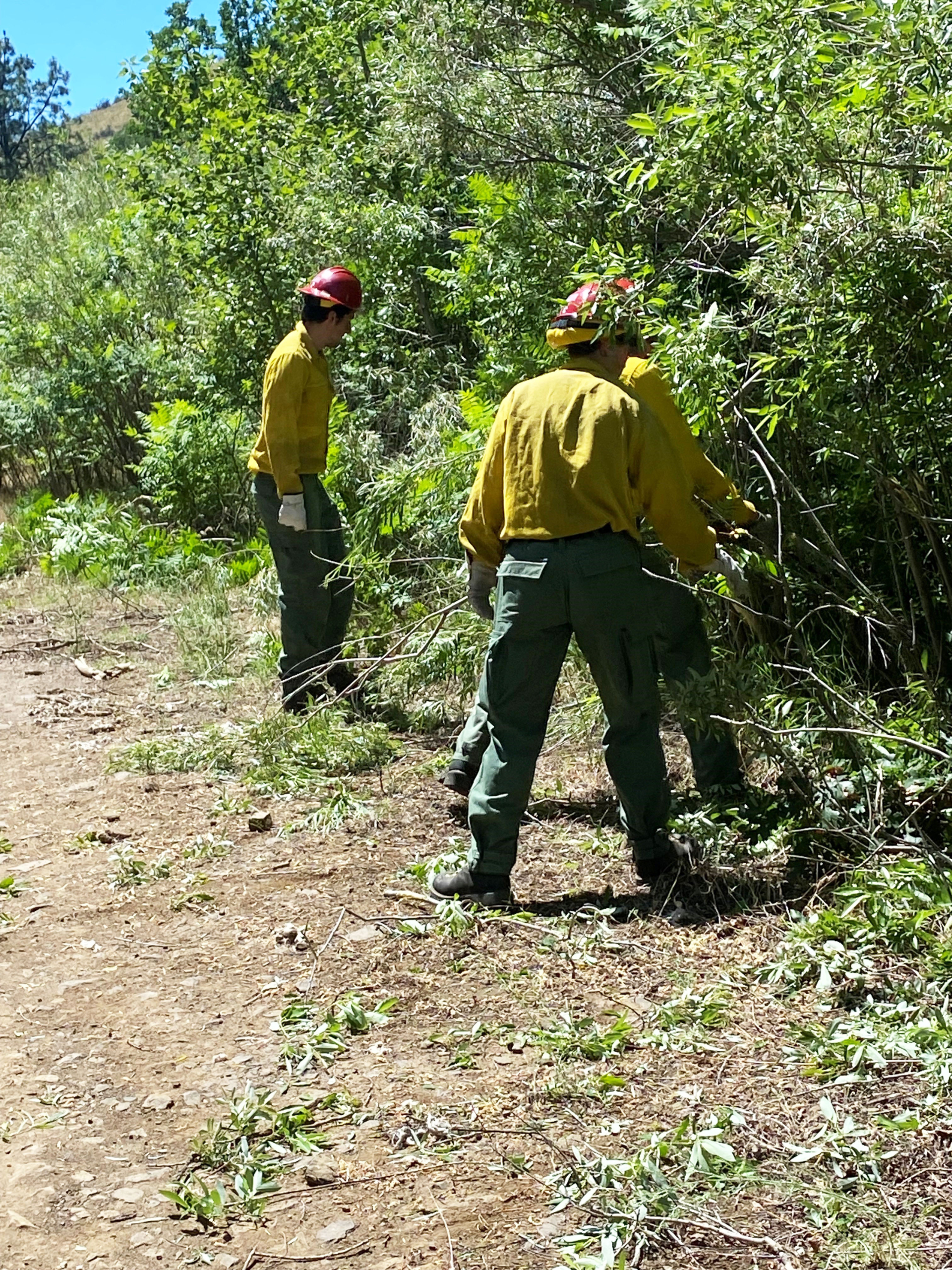
A five-person Fort Simcoe Job Corps fire module removed brush along a roadway for a thinning project and helped patrol Yakama Nation tribal lands during the Nation’s Treaty Days holiday in June 2023. USDA Forest Service photo by Matthew Ball.
Ball is navigating other challenges. Fort Simcoe does not have enough students and wildland firefighting is not a certified trade. Ball borrows his students from other trades and his students are deployed as a militia. One plus is that the students that find their way to him are ranch kids unafraid of hard work. Then there is the typical government bureaucracy including all-day meetings and learning agency procedure to purchase the equipment need for a wildland fire training program. Ball needs to travel the state to sell his program and he still does not have a fire vehicle. “Mine is on order and you know how that works,” he reflected. “I will take anything right now, except for a Prius. I won’t drive a Prius.”
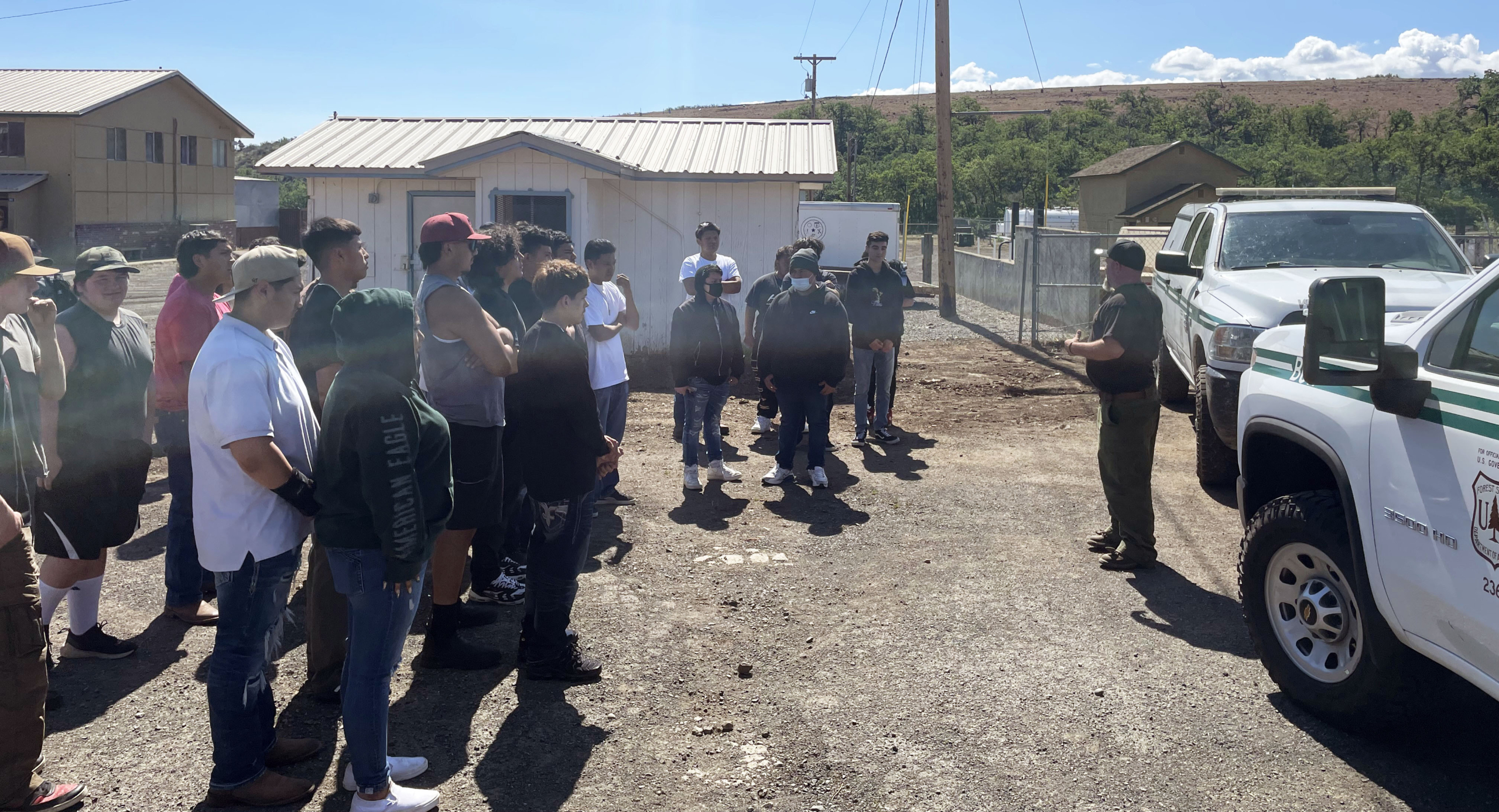
On May 17, 2023, Fort Simcoe Job Corps students gather to learn more about wildland firefighting training and deployment opportunities during a trade day. USDA Forest Service photo by Matt Ball.
When asked what is needed the most to bolster and support the Job Corps program, Ball does not hesitate. “We’ve got to have the staff that has the heart and want to see the change. You have to love this job to do it because the money isn’t there,” he stated. “It’s hard to get the staff here with the amount they are paid. You can really see it here at Fort Simcoe with all job vacancies. There is nothing that anyone can do to really fix this program until they fix the wages.” Despite his own and his family’s sacrifices, Ball has no regrets about his decision accepting the job. “I would not take anything back. This is my life and it was meant to be.”
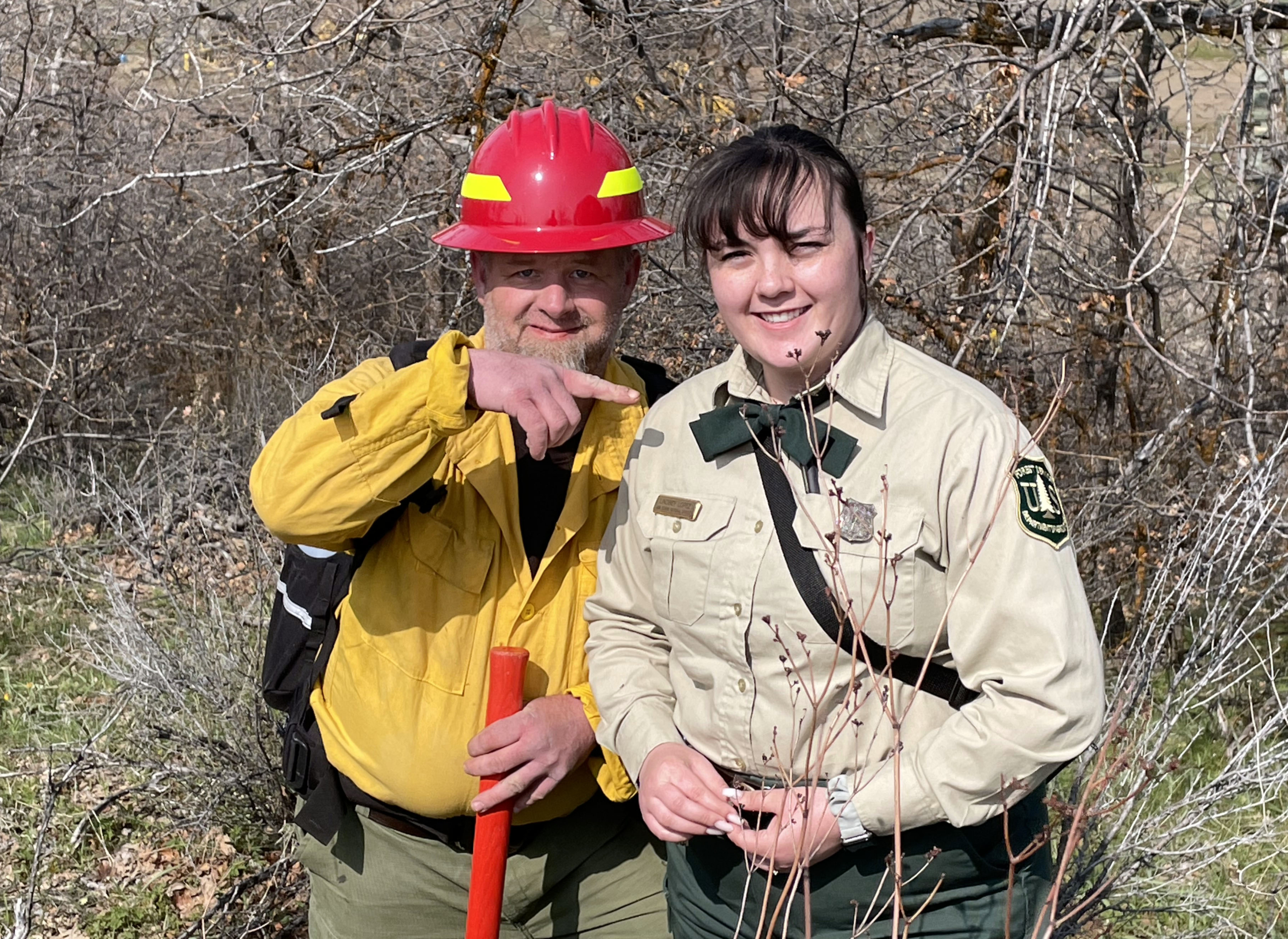
(l-r) Fort Simcoe Job Corps Assistant Fire Management Officer Matthew Ball and Columbia Basin Job Corps Administrative Support Assistant Lindsey Lopez take advantage of a photo opportunity on April 13, 2023. USDA Forest Service photo by James Harbour.


































































